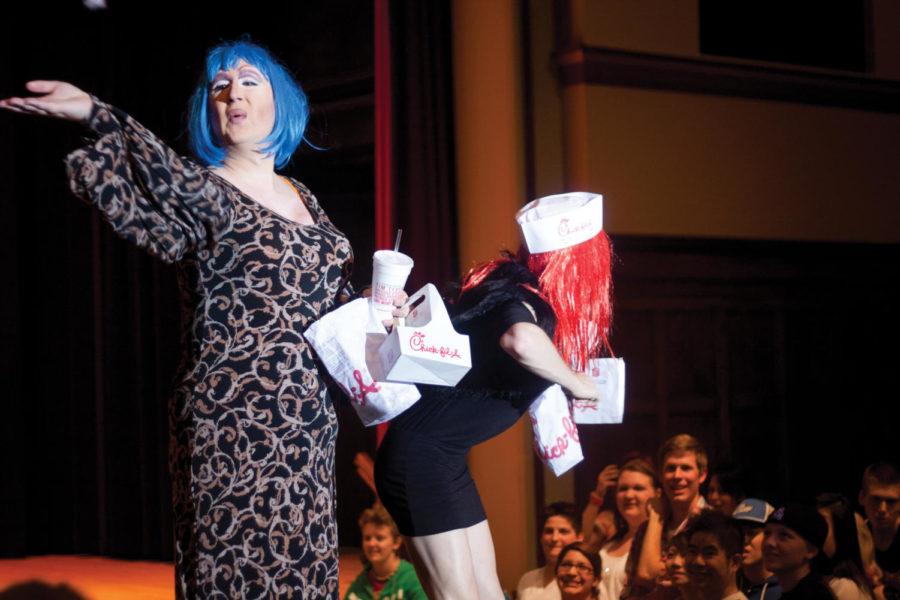Coming out: an experience then and now
Clint Currie and Elliott Devore, graduate assistant-administrative in educational leadership and policy studies, perform a spoof of “Hold On” by Wilson Phillips Friday, April 6, during the LGBTA Drag Show in the Great Hall of the Memorial Union.
April 8, 2013
It has been 42 years and seven months since the Stonewall Riots, which have been called a major turning point in the LGBT movement.
April 8, 2013 kicks off Pride Week, a celebration of LGBT pride, community and the development of new social freedoms.
“I was constantly bullied; every day I would be bullied by the boys. I didn’t fit in. I didn’t perform my gender the way that I was supposed to,” said Warren Blumenfeld, associate professor in education.
Blumenfeld grew up in the late 1940s and early 1950s and came out before there were any LGBT alliances.
Sarah Miller, senior in genetics and president of Gamma Rho Lambda sorority, who came out during her sophomore year at Iowa State, grew up in a suburban upper-middle-class environment.
“It was a tough place to be if you were anything other than cookie-cutter,” Miller said.
Miller said it was an environment with very little diversity and that people who didn’t fit into the norm had a tough time growing up there.
She felt different from the other girls, but backlashed against the rumors that she was a lesbian, saying it was not true.
“I was trying very hard to be anything but gay because I just had this negative association with it,” Miller said. People in school and extended family members would make remarks casting negativity on homosexuality.
For fear of having their child grow up to be gay, Blumenfeld’s parents took him out of school twice a week to see a child psychologist from the time he was 4 until he was 12 years old.
Blumenfeld said he had no friends growing up because he didn’t act like a boy was supposed to act. He played violin and liked to sing instead of being interested in sports, which singled him out.
Blumenfeld said looking back there were some people in high school who he knew were gay, but he also knew they couldn’t tell anybody.
“It was something we couldn’t even talk about back then,” Blumenfeld said.
Even though Miller had not accepted being lesbian, she was able to speak with a single close friend during high school about feeling different and not understanding why.
“Having a supportive individual in my life when I didn’t feel like I had support anywhere else, I know that that’s something that not all people have and that was a really important thing to me,” Miller said.
Blumenfeld started coming out to friends during his undergrad years from 1965 to 1969.
“We had this underground network of people we knew. We got together just for social support and then in 1970, my first year of grad school, we started a group called the Gay Liberation Front in San Jose, Calif.,” Blumenfeld said.
After grad school, Blumenfeld helped start the National Gay Student Center in Washington D.C., traveling around the United States to help organize LGBT groups on college campuses.
At this time only a few hundred campuses in the country had LGBT groups.
“We really live in an age right now where there’s the Internet and there’s resources. I was able to access a lot of information and meet other people who were going through the same things that I had either gone through or was going through,” Miller said
During Miller’s sophomore year of college she was able to take advantage of many resources offered by LGBT Student Services at Iowa State. She attended a Speakers Bureau panel, which she is now on, and realized she could relate to their experiences and how they felt.
When Blumenfeld was coming out, he had to be careful who he told and his sexual identity was not accepted in society. Miller said while she doesn’t broadcast it, she has no concerns if someone finds out she is lesbian and said she feels safe in the Ames community.
At LGBT Student Services, students have access to support and activism groups as well as two full-time staff members who work with those groups to organize LGBT support and pride events.
There will be Pride Week events all week, ending with a pride rally in the afternoon of April 12 and a drag show in the evening.

















